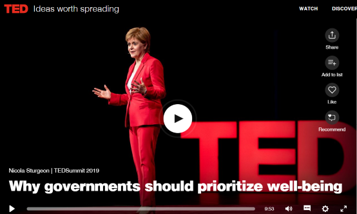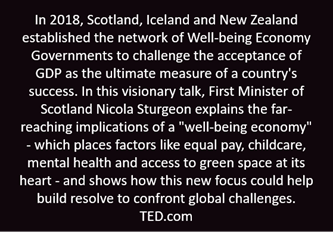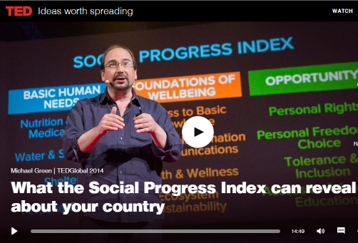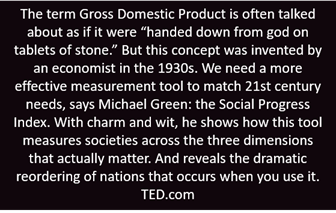Measure what matters and investigate what impacts.
Author: Catherine Trigg / Liz Barnes.
Psychologists and economists generally agree that 'you get what you measure'. This is because humans adjust their behaviour based on the metrics they're held against. So when we are designing research and insight programmes, we need to 'start with the end in mind'. We will evaluate progress and performance, so what will be our measures of success? What outcomes are we looking for? Not what outputs do we want.
It is such a shame that researchers may not be involved in these strategic, far-reaching discussions, but as charity and social marketers / researchers - we need to raise our voice, and join these debates to ensure that our insight recommendations, methodology and approach WILL measure what matters.
We reviewed two videos that take a deeper look at some societal measurements at work.
 “GDP is flawed. It ignores the environment. It counts bombs and prisons as progress. It can't count happiness or community. And it has nothing to say about fairness or justice. Is it any surprise that our world, marching to the drumbeat of GDP, is teetering on the brink of environmental disaster and filled with anger and conflict?”
“GDP is flawed. It ignores the environment. It counts bombs and prisons as progress. It can't count happiness or community. And it has nothing to say about fairness or justice. Is it any surprise that our world, marching to the drumbeat of GDP, is teetering on the brink of environmental disaster and filled with anger and conflict?”
“GDP … says nothing about … whether [our] work is worthwhile or fulfilling. It puts a value, for example, on illegal drug consumption, but not on unpaid care. It values activity in the short term that boosts the economy, even if that activity is hugely damaging to the sustainability of our planet in the longer term.” (Nicola Sturgeon, TEDSummit 2019)
See the Nicola Sturgeon TedTalk video here:
https://www.ted.com/talks/nicola_sturgeon_why_governments_should_prioritize_well_being
 Ms Sturgeon opens her talk by referring to Adam Smith, the world-renowned 18th Century Scottish economist. He argued that a country’s wealth could not be assessed only on its gold and silver reserves, but on “the totality of [its] production and commerce.” This assertion, Ms Sturgeon suggests, is “one of the earliest descriptions of what we now know today as gross domestic product, GDP.”
Ms Sturgeon opens her talk by referring to Adam Smith, the world-renowned 18th Century Scottish economist. He argued that a country’s wealth could not be assessed only on its gold and silver reserves, but on “the totality of [its] production and commerce.” This assertion, Ms Sturgeon suggests, is “one of the earliest descriptions of what we now know today as gross domestic product, GDP.”
“ … when we focus on well-being, we start a conversation that provokes profound and fundamental questions. What really matters to us in our lives? What do we value in the communities we live in? What kind of country, what kind of society, do we really want to be?” (Nicola Sturgeon, TEDSummit 2019)
 A more recent foundation stone of GDP is described by Michael Green in his TED talk of 2014. Mr Green attributes origin of the concept to the economist Simon Kuznets, who delivered the report "National Income, 1929-1932" to the United States
A more recent foundation stone of GDP is described by Michael Green in his TED talk of 2014. Mr Green attributes origin of the concept to the economist Simon Kuznets, who delivered the report "National Income, 1929-1932" to the United States
Congress. This was an essential report at the beginning of the Great Depression; with its subsequent yearly updates it provided the economic data to help policy makers negotiate a way out of the slump.
“I believe that we're living in a moment when we are ready for a measurement revolution” says Green. Whereas the concept of GDP was useful to fix a specific twentieth century problem, both he and Ms Sturgeon assert that the twenty-first century’s challenges require a completely different way of measuring.
“We need a better way to measure our societies, a measure based on the real things that matter to real people. Do I have enough to eat? Can I read and write? Am I safe? Do I have rights? Do I live in a society where I'm not discriminated against? Is my future and the future of my children prevented from environmental destruction? These are questions that GDP does not and cannot answer.” (Michael Green, TEDGlobal 2014)
See the Michael Green TedTalk video here:
https://www.ted.com/talks/michael_green_what_the_social_progress_index_can_reveal_about_your_country
 Michael Green’s solution is the Social Progress Index, first formulated for the use of 50 countries in 2013. In its latest version it was used by 146 countries in 2018. This index measures progress in three different 'dimensions', which are reminiscent of Maslow’s hierarchy of needs. “The first is, does everyone have the basic needs for survival: food, water, shelter, safety? Secondly, does everyone have access to the building blocks to improve their lives: education, information, health and sustainable environment? And then third, does every individual have access to a chance to pursue their goals and dreams and ambitions free from obstacles?” (Green, 2014)
Michael Green’s solution is the Social Progress Index, first formulated for the use of 50 countries in 2013. In its latest version it was used by 146 countries in 2018. This index measures progress in three different 'dimensions', which are reminiscent of Maslow’s hierarchy of needs. “The first is, does everyone have the basic needs for survival: food, water, shelter, safety? Secondly, does everyone have access to the building blocks to improve their lives: education, information, health and sustainable environment? And then third, does every individual have access to a chance to pursue their goals and dreams and ambitions free from obstacles?” (Green, 2014)
Mr Green’s data highlights some countries with high GDP and fairly low social progress, in contrast to others with good social progress despite poor GDP. (View the video to see the scores of individual countries). He makes the point that wise investment of a modest GDP increase, can result in significant progress in society’s well-being.
Both Ms Sturgeon and Mr Green draw attention to warnings that were unheeded in the development of GDP as the sole measure of country’s progress. Adam Smith had stated in his earlier work ‘The Theory of Moral Sentiments’ that a government is judged “in proportion to the extent that it makes its people happy". Simon Kuznets had written in his report to Congress: "The welfare of a nation can, therefore, scarcely be inferred from a measurement of national income as defined above".
Nicola Sturgeon describes the establishment of the Well-being Economy Governments group, which was established on the premise that “the objective of economic policy should be collective well-being”. The founder members were Scotland, Iceland and New Zealand. (See https://www.statista.com/statistics/256975/worldwide-index-of-social-progress/ to compare the social progress ranking of Iceland and New Zealand with that of other countries.)
Ms Sturgeon introduces her audience to Scotland’s measurement of Well-being: the National Performance Framework, which comprises 81 national indicators, most of which relate to quality of life which is not quantifiable by pure economic data.
Both speakers emphasise the inadequacy of measuring only how much money is spent on services, and the importance of checking people’s experience of how well that service has been delivered. In this approach, qualitative research is seen as a vital part of evidence-gathering.
About the article:
TED.com videos reviewed by Catherine Trigg / Liz Barnes. Specific links in text above. https://www.ted.com